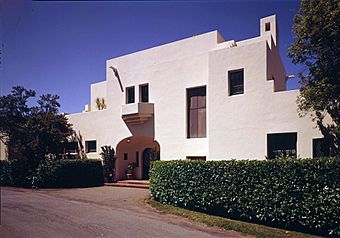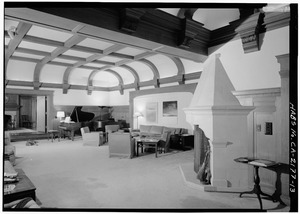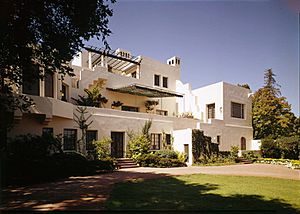Lou Henry Hoover House facts for kids
|
Lou Henry Hoover House
|
|

View of the house from the northwest
|
|
| Location | Stanford University, Stanford, California |
|---|---|
| Area | 2.1 acres (0.85 ha) |
| Built | 1920 |
| Architect | Lou Henry Hoover |
| Architectural style | International/Mission Revival |
| NRHP reference No. | 78000786 |
Quick facts for kids Significant dates |
|
| Added to NRHP | January 30, 1978 |
| Designated NHL | February 4, 1985 |
The Hoover House, also known as the Lou Henry Hoover House, is a special historic home. You can find it on the campus of Stanford University in Stanford, California. This house was finished in 1920. It was once the home of Herbert Hoover, who became the 31st President of the United States. His wife, Lou Henry Hoover, actually designed it herself! Today, it is the official home for the president of Stanford University. The house is also important because it's an early example of the International Style of architecture. It was recognized as a National Historic Landmark in 1985.
Building the Hoover House
Before World War I ended, the Hoovers had asked an architect named Louis Christian Mullgardt to design their home. However, Mullgardt told everyone about his job before the war was over. This made the Hoovers upset. They felt it was not the right time to announce a big house when a terrible war was still happening. So, Mullgardt was fired.
After talking to many people, the Hoovers convinced Arthur Bridgman Clark to be their architect. Clark was an art professor at Stanford. He worked as an architect during the summer. Clark agreed, but only if Mrs. Hoover designed the house. He and his son, Birge Clark, would help with advice and drawings. Mrs. Hoover drew her ideas and watched the building work. If anyone told her one of her ideas wasn't usually done, she would say, "Well, it's time someone did!"
The house looks much smaller from the outside than it actually is inside. This is because it was built into the side of San Juan Hill. The house seems to disappear into the slope. It has an unusual shape and was built on a strong concrete base. It has two stories in the front and three stories in the back.
Some architects think Mrs. Hoover's designs were inspired by homes she saw in Algeria, North Africa. The house also has parts of Mission Revival Style. Others have even seen influences from Pueblo homes.
Herbert Hoover had one main request: the house had to be fireproof. So, the walls were made of hollow tiles. The house was built from 1919 to 1920. It was the only permanent home the Hoovers ever owned.
Life in the House
The Hoovers lived in the house for only a short time. In 1921, Herbert Hoover was asked to be the United States Secretary of Commerce. He served in this role for two presidents. He was at this house when he found out he won the Presidential election in 1928. He also heard the news here when he lost the election in 1932.
During his time as president (1929–1932), the Hoover family only visited their Stanford home briefly. They returned to live in the house after 1932. They also kept an apartment in New York.
After Lou Hoover passed away in 1944, her husband gave the house to Stanford University. He wanted it to be a home for university professors. Today, it is the official residence for the university president. It is not open to the public. In 2008, solar panels were added to the house.
![]() This article incorporates public domain material from websites or documents of the National Park Service.
This article incorporates public domain material from websites or documents of the National Park Service.
See also
 In Spanish: Casa Lou Henry Hoover para niños
In Spanish: Casa Lou Henry Hoover para niños
 | Toni Morrison |
 | Barack Obama |
 | Martin Luther King Jr. |
 | Ralph Bunche |





